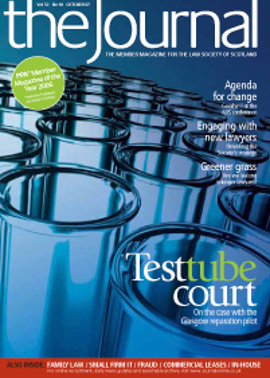Leases: the war is over?

Many property lawyers spend a large part of their working day wasting their time and that of their clients. They achieve this by immersing themselves in the industry that has grown up over the years around commercial leasing.
I am old enough to remember Alfie Phillips, of Alexander Stone & Co as it then was, recalling his earlier years in the 1950s when conveyancing, in the sense of buying and selling commercial property, was a very serious business (albeit probably easier than it is now), while the requirement as part of that process to agree a lease was a mere trivial sideshow: the lease was probably a page or two long and was agreed very quickly.
Things changed, mainly from the 1980s onwards, with the introduction into Scotland of the full repairing and insuring lease. This was largely imported from England, and the signs are still there, in that there is little in a modern Scottish FRI lease which is not readily recognisable to an English practitioner. There will be a few fiddly Scottish bits, but not many.
The industry was thus spawned, and clearly my firm and others played a significant part in that. The question now is whether the game is largely played out.
In England and Wales, the new Lease Code is designed to achieve a significant degree of harmonisation in commercial leasing provisions, and there is significant buy-in at a high level to that concept. In particular, the parties are being asked to take a sensible and reasonable approach to certain key matters, and that general approach appears to be finding broad favour in the industry.
The old shibboleth to the effect that reasonable tenant amendments could not be accepted as the institutional landlord would not accept them, if ever it were true, looks increasingly unsustainable these days, with landlord clients taking a more balanced approach to lease terms. Often, as a consequence, the role of the property lawyer seems to be to obstruct, rather than achieve, progress.
Room for dispute?
If one analyses the modern Scottish commercial lease, how much of it is really worth spending time negotiating?
Consider the following:
- Acting reasonably
Some landlord-oriented leases may omit these magic words in the first draft. If revised in, they are readily conceded, so what is the point? Given the courts’ apparent desire to read a test of reasonableness by implication into other provisions in legal documents, such as the construction of the phrase “as to which the purchaser shall be sole judge”, is this debate worth it?
- Compliance with statute
Can the obligation not be expressed in two lines, rather than 10 pages?
- Alterations
There are standard revisals to a standard alterations clause. We all know what they are.
- Alienation
The norm is clear. Assignation of the whole should require reasonable consent; assignation of part should be prohibited; subletting of the whole should probably require reasonable consent; and there may be issues about partial subletting depending on the nature of the property. Granting rights of occupancy to group companies should go through on the nod.
- Rent review
We have developed a standard set of assumptions and disregards which we all know. There may need only be a few tweaks, if that, to a typical rent review clause to fit the particular circumstances. There should be no debate about the level of interest payable on the balancing payment following settlement of the review.
- Use
There will typically be a specified user, with reasonable consent required to changes. The only issue is the scope of that reasonable consent, e.g. within use classes only or beyond that.
- Repairs
There is standard FRI wording, and there are standard exclusions in relation to damage by insured risks, subject to insurance shortfall being made up by the party at fault.
- Insurance
The basic setup is well established. The landlord insures at the cost of the tenant; the landlord rebuilds; there is rent cesser and a termination provision; there is generic/specific endorsement of the tenants’ interest.
- Irritancy
There is a standard clause. There is a standard revisal.
- Guarantee
Again, there is recognised standard wording, and the only issue is to make sure that the obligations guaranteed are those of the named tenant only.
- Other standard clauses
Is there really anything worth debating about clauses dealing with payment of rates, decoration, nuisance, title conditions etc?
- A mature market
All of this suggests to me that property lawyers in Scotland should be devoting their energies to something other than leasing wars.
My argument is not necessarily for a standard lease form per se, but instead a recognition that the vast bulk of provisions in firms’ precedent leases can themselves be readily reduced to an agreed position: there is little to be gained for the client, therefore, in not enshrining that position in the precedent itself. Lawyers instructed in new leases should no longer look forward to digging down into an entrenched negotiation which will keep them occupied for weeks, while the landlord waits for his rent and the tenant waits for his keys.
I accept that this rationale may work more readily with single occupancy leases. Multi-occupancy leases of shopping centres, for instance, bring their own issues, although even there the general regime in relation to service charge and other distinctive features is becoming familiarly standardised these days. The RICS has, of course, being doing sterling work on the whole issue of a Service Charge Code. A Scottish version of that document has also now been launched.
March of commoditisation
We are even beginning to standardise service charge exclusions in relation to initial development costs etc in multi-occupancy leases. Some work requires to be done on that yet, though, given the propensity of some of my brethren to seek to exclude from service charge matters which on no analysis could ever be comprehended within the service charge provisions in the first place. I have yet to see an exclusion in relation to the cost of the centre manager’s children’s school fees, but no doubt that will come.
Property lawyers need to recognise that, with land registration, a marked shift in the attitude of clients, general consumer pressure, and the sharing of knowledge via modern technology, a large part of what they have historically done is becoming commoditised, and it deserves to be commoditised. Leasing lawyers need to give up their dependency on this drug and move on. Many property lawyers are technically excellent lawyers with commendable drafting skills. They can deploy these skills in lots of other areas, including projects work and general commercial contractual drafting – which needn’t be left as the province of their corporate colleagues.
If property lawyers don’t take stock of this situation, they will become largely extinct as a breed. And they will deserve to become so.
Iain Macniven is a partner in Maclay Murray & Spens LLP.
He has specialised in commercial property work for over 25 years and is a member of the Property Standardisation Group. The views expressed in this article are personal ones, which do not necessarily reflect the views of colleagues in either MM&S or the PSG.
In this issue
- Advocacy in mediation
- Your voice will count
- Does justice need fixing?
- A case for trial?
- The tide for change
- New lawyers for all
- Leaving the profession
- Three proposals
- Options ahead on standards
- Know the need, know the cure
- The file at your fingertips
- Fraud: making your strategy work
- A wider view
- Pub games reborn
- Working with OSCR
- Goal to Leeds
- "We're all doomed" - or are we?
- Website reviews
- Book reviews
- Out of my depth?
- Court bars in-house privilege
- Leases: the war is over?
- ARTL picks up speed






